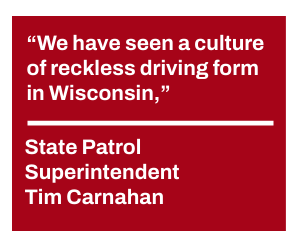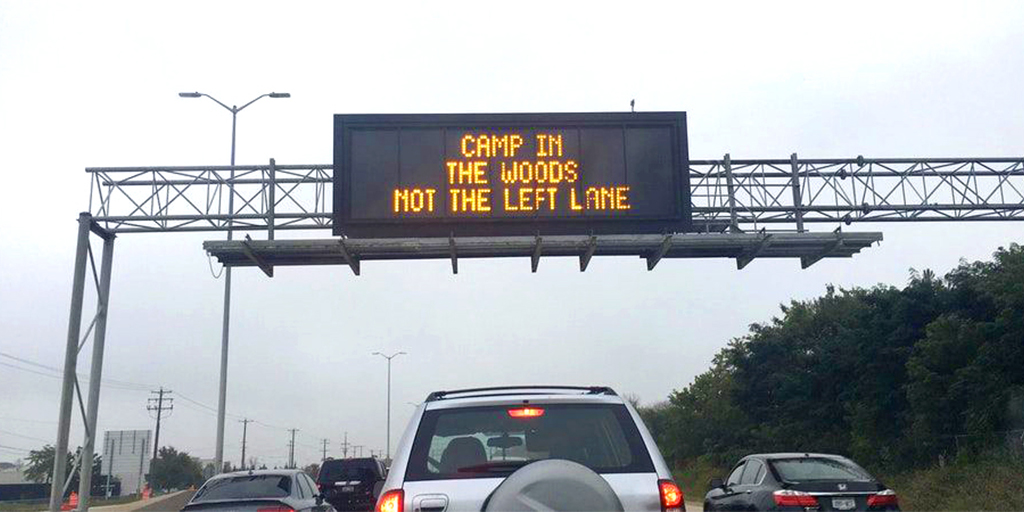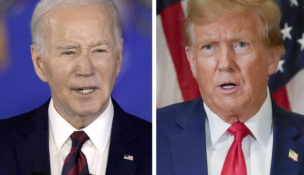Law of the Month: Reckless driving prevention
By: Steve Schuster, [email protected]//July 10, 2024//
Law of the Month: Reckless driving prevention
By: Steve Schuster, [email protected]//July 10, 2024//
Reckless driving puts everyone on and near the road in danger, says the Wisconsin Department of Transportation (WisDOT).
The problem has been recognized by state, county, local government and even The Milwaukee Bucks.
According to WisDOT, excessive speed, distracted driving and aggressive driving are just a few of the reckless behaviors that threaten the safety of our roadways.
Reckless driving prevention is the Wisconsin State Patrol’s July Law of the Month to encourage all motorists to take simple steps to eliminate crashes caused by reckless driving.
Despite Gov. Evers’ execution of a $6 million bipartisan bill last year aim to curb reckless driving, the problem have worsened.

“We have seen a culture of reckless driving form in Wisconsin,” State Patrol Superintendent Tim Carnahan said. “We need to encourage one another to pay attention on the roads and follow the rules put in place to protect each other. We have to work together to shift the culture of distracted and reckless driving to prevent further lives lost,” Carnahan added.
In 2023, there were over 5,500 reckless driving crashes in Wisconsin, according to WisDOT. 3,081 people were injured and 137 people were killed by a reckless driver, WisDOT noted.
Wisconsin’s weak drunk and reckless driving laws
Wisconsin’s drunk driving and reckless driving laws are among the weakest in the nation, putting post law enforcement and the motoring public at grave risk.
Wisconsin remains the only state in the nation where operating while intoxicated (OWI) is classified as a traffic violation in Wisconsin, rather than a criminal matter for a first offense.
Although reckless driving is illegal in Wisconsin. A driver faces up to $400 in fines for a first offense.
Compare that to reckless driving laws in border states.
In Illinois: A misdemeanor reckless driving conviction where no aggravating circumstances exist, the motoring public faces up to one year in jail and a fine of up to $2,500. For a first offense, motorists may only be fined and then receive probation or community service as opposed to time in jail, according to Dolci and Weiland, Illinois attorneys.
In Minnesota: Standard reckless driving in MN is considered a misdemeanor, which is punishable by up to 90 days in jail and up to a $1,000 fine. In the event a motorist has prior driving record infractions, driving privilege may be lost, according to Aarechigo Stokka Minnesota Attorneys. If someone is seriously injured in a reckless driving crash, the driver could face up to six years in prison and $10,000 in fines, according to the firm.
In Michigan: For a first offense reckless driving charge, the Michigan Secretary of State may suspend the offending motorist’s driver’s license for up to 90 days, plus impose additional fines. If said motorist has previously been convicted of reckless driving more than once within seven years, that motorist faces a possible mandatory license revocation for at least one year, according to the Michigan Bruce Law Firm.
In Iowa: Reckless driving in Iowa is a simple misdemeanor, which is punishable by: up to 30 days in jail and a fine up to $625, according to the Iowa firm of McCarthy and Hamrock.
Back in Wisconsin a reckless driving charge could include negligent behaviors like speeding; improper lane changes; and inattentive, erratic or aggressive driving. Red light running, tailgating, illegal passing and drifting are also reckless driving behaviors, according to WisDOT.
Reckless driving prevention
Crashes caused by reckless driving can easily be prevented, according to WisDOT.
On local level, Milwaukee Mayor Cavalier Johnson outlined a strategy to combat reckless driving at his 2023 ‘State of the City’ address.
According to Johnson the city is addressing reckless driving in four ways:
- Formally tasking city staff to lead the response (implementing best practices from organizations such as NACTO and Vision Zero and Department of Public Works)
- Education – Partners such as the Greater Milwaukee Urban League are working to get hundreds of people trained and licensed to drive
- Constricting lanes and adding crosswalk bump-outs. Focusing on pedestrian safety
- Enforcement – The Milwaukee Police Traffic Safety Unit – holding reckless drivers accountable for their actions. However, law enforcement is severely limited by Wisconsin’s weak reckless driving laws.
Back on a state level, WisDOT said, follow the simple steps below and encourage other drivers to do the same to eliminate tragedies caused by reckless driving.”
- Don’t speed. Speed increases the severity of crashes.
- Avoid distractions. 1 in 5 crashes involves distracted driving. Turn off your phone or download an app to prevent incoming and outgoing messages, calls and notifications while driving.
- Drive courteously. Courteous driving encourages other drivers to be courteous. Aggressive driving influences others to drive aggressively.
Encountering reckless drivers
Reckless driving affects drivers, passengers, pedestrians and bicyclists, according to WisDOT. Follow the WisDOT tips below if you encounter a reckless driver:
- If you are in the left lane and someone wants to pass, move over and let them by.
As previously reported, in Wisconsin the left lane on interstate highways is a travel lane, not a passing lane, which can be one source of road rage, according to the State Patrol.

Last Summer the State Patrol said they have observed motorists driving below the posted or zoned speed limit in the left lane, creating frustration for motorists and in some cases even instances of road rage.
In both Michigan and Illinois, the left lane is a passing lane, not a travel lane.
Pursuant to Illinois law, “when driving on an interstate highway … a driver may not drive in the left lane(s), except when passing another vehicle.”
So why doesn’t the Wisconsin Legislature pass a similar law to reduce reckless driving?
The short answer? Wisconsin’s unique culture.
“I don’t know how you change an entire culture,” said Justin Bielinski spokesperson for Sen. Chris Larson during an interview with the Wisconsin Law Journal last Summer.
According to Bielinski, it would take a large taxpayer investment of law enforcement resources to enforce the legislation (making the left lane a passing lane on Wisconsin interstates.)
But then, why doesn’t Wisconsin legislators make drunk driving laws tougher?
As previously reported, Bielinski previously said bills to criminalize first offense drunk driving in Wisconsin did not advance because of the Tavern League’s heavy pay-to-play influence over lawmakers.
A Wisconsin Law Journal investigation revealed the Tavern League of Wisconsin has donated more than $685,585 to Wisconsin Republicans and $151,849 to Wisconsin Democrats over the past three decades, according to FollowTheMoney.org.
- Give speeding drivers plenty of space. Speeding drivers may lose control of their vehicle more easily.
Unlike Illinois, Wisconsin has not deployed speed cameras to deter reckless driving behaviors.
- Adjust your driving accordingly. Speeding is tied to aggressive driving. If a speeding driver is tailgating you or trying to engage you in risky driving, use judgment to safely steer your vehicle out of the way.
- Call law enforcement if you believe a driver is following you or harassing you.
Partnerships for prevention
The Wisconsin State Patrol works year-round to stop reckless drivers before they cause harm through daily visibility on highways and special enforcement efforts including:
- Aerial enforcement: These missions allow State Patrol pilots to spot drivers on major traffic routes who are speeding, tailgating or driving recklessly. The pilots work with ground-based officers to initiate a traffic stop.
- Special enforcement campaigns: Troopers and inspectors partner with other local law enforcement agencies for special enforcement campaigns to address issues like reckless driving throughout the year.
- Speed Awareness Day: Wisconsin agencies join law enforcement states across the region for a Speed Awareness Day enforcement campaign on July 31, 2024. The goal is to raise awareness and save lives.
- Trooper in a Truck: Through a partnership with the Wisconsin Motor Carriers Association, troopers have a unique opportunity to ride along with semi-truck and bus drivers to enforce traffic laws from an elevated vantage point. This year, the annual enforcement and education initiative takes place from July 8 through July 12.
Legal News
- Outside the RNC, small Milwaukee businesses and their regulars tried to salvage a sluggish week
- Biden called to resign immediately after the president announces he won’t seek reelection
- Biden drops out of 2024 presidential race, endorses Harris
- Local PA cops allegedly thought Trump’s would-be assassin was Secret Service
- Biden-Lead Secret Service admits agency denied past requests by Trump’s campaign for tighter security
- Class action filed against Walgreens
- Former Waukesha County Sheriff’s Office lieutenant pleads guilty to smuggling contraband
- Two dead, one injured after Ozaukee County water rescue
- RNC Final Day: Trump accepts GOP Nomination
- Wisconsin officials intervene in Planned Parenthood action
- 7th Circuit adopts modifications to Rules 31, 34, 40, 47 and 60
- MPD issues statement on outside agency officer assignments
Case Digests
- Absentee Ballot Drop Boxes
- Separation of Powers- Legislative Oversight of Executive Actions
- Notice of Recommitment and Involuntary Medication Hearings
- Firearm Possession-Sufficiency of Evidence
- Motion for Substitute Counsel
- Jury Instructions
- Equal Credit Opportunity Act
- Fourth and 14th Amendment Rights-Parental Medical Neglect
- Eminent Domain
- Intrusion Upon Seclusion Claim-§1983 claim
- Employment Law- Title VII
- Employment Law












